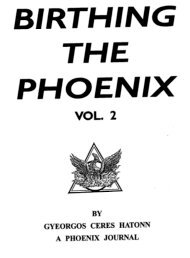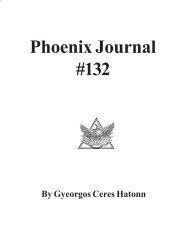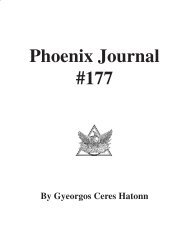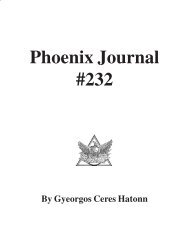Create successful ePaper yourself
Turn your PDF publications into a flip-book with our unique Google optimized e-Paper software.
heaven.”<br />
II Kings 17: 16: “And they left all the commandments of the Lord their God, and made them molten<br />
images, even two calves, and made a grove, and worshipped all the host of heaven, and served Baal.”<br />
Also see Deut. 4:19; 17:3; II Kings 21:3; 21:5; 23:4-5; II Chron. 33:3; Jere. 8:2; 19:13; Zeph. 1:5,<br />
etc.<br />
Acts 7:42: “Then God turned, and gave them up to worship the host of heaven....”<br />
I used to wonder why the ancients were so strongly into worship of the stars and planets. Now I understand<br />
that the planets were interacting with Earth and causing terrible catastrophes, causing humans to<br />
consider them as gods and causing humans to go even so far as to practice human sacrifice in order to try<br />
to placate these “gods”.<br />
Let’s review some more quotes from the ancients:<br />
“There are also stars that suddenly come to birth in the heaven itself.... The Greeks call them comets”<br />
(Pliny 2:22:89)<br />
“Athena sprang from the skull of Zeus with an earth-shattering battle-cry, so that the heavens shook and<br />
the mother Earth [shook]” (Pindar, Olympia 7:36).<br />
Athena is the Greek name for the Roman Venus, and Zeus is the Greek name for the Roman Jupiter (Zeuspiter).<br />
Scholars studying Greek and Roman mythology have debated what the meaning is of Venus springing<br />
from the head of Jupiter and have come up with all kinds of “possible” explanations. It never occurred<br />
to them that this so called mythology might be an explanation of real events observed by eye-witnesses!<br />
Perhaps there was an explosion on Jupiter, which hurled out a chunk of flaming material that became a<br />
comet, called Venus, Athena, etc., in the various languages. This comet interacted with Earth and Mars,<br />
causing tremendous damages. It eventually might have been thrown into its current orbit and lost its tail and<br />
is now known as the planet Venus.<br />
The Homeric Hymn of Athena says: “And before Zeus the aegis-holder she sprang swiftly from his<br />
immortal head, brandishing a sharp-pointed spear [comet with tail, described as a sharp-pointed spear].<br />
Great Olympos quaked dreadfully under the might of the gray-eyed goddess, as the Earth all about resounded<br />
awesomely, and the sea moved and heaved with purple waves [earthquakes and tidal waves].”<br />
Meteor showers occurred as Earth passed through the tail of the comet, and the meteorites were worshiped<br />
as sacred objects. For instance, the Arab Dome of the Rock near the Wailing Wall in Jerusalem has<br />
a large, black meteorite as the sacred object in the middle of the room. (See H. Newton, “The Worship of<br />
Meteorites,” in the American <strong>Journal</strong> Of Science, 3:13, pp. 1-14.) The sacred object at Mecca is a<br />
meteorite.<br />
On the other side of the world, the Iroquois Indians reported that the goddess Nokomis—the famed<br />
grandmother of Hiawatha—fell from heaven as a comet. Favorite Poems Of Henry Longfellow, p. 165,<br />
“From the sky a star is falling” and just before she fell she was swinging from a long vine.<br />
<strong>10</strong>
















